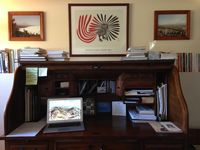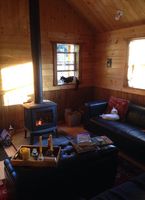At the Desk: Jenna Butler
Many writers wear a lot of hats, between dayjobs, other passions, and family demands. But Jenna Butler has a particularly interesting second identity, and she's brought her other life and her writing life together in A Profession of Hope: Farming on the Edge of the Grizzly Trail (Wolsak and Wynn).
Since 2006, Jenna and her partner have defied the odds to run Larch Grove Farm. A Profession of Hope tells their story, making a passionate case for small, organic farming and for following one's dreams.
We're pleased to welcome Jenna to Open Book today, where she tells us about her two workspaces — an urban one and her magical space on the farm, including furry gargoyles and kitchen table writing sessions.
You can also read an excerpt from A Profession of Hope on the Wolsak and Wynn website (scroll to the bottom of the book page for the link).
_________________________________________________________________
Jenna Butler:
I’m a writer/teacher/farmer in constant motion between the classroom and the market garden, and because of that, my workplace is a balancing act between a city study and a boreal cabin. When I’m in Red Deer, where I stay during the school week, I’ve got my study set up on the lower floor, a space I share with my husband and our two cats. When I’m at the farm, I work at the old butcher block table in our tiny 250-square-foot off-grid cabin, lit mostly by beeswax candles and natural daylight. I inhabit each space for about half the year, though I consider the farm home.
My study in Red Deer is a tangle of teaching work and writing work. I teach between eight and nine college courses a year as a full-time faculty member, so there are days when the marking stacks overwhelm my desk completely and I can’t even see the surface, let alone my own writing. And then there are times when I’ve cleared the deck and handed everything back to my students, and my creative time is my own. It’s a constant give-and-take, with literary writing time coming and going around that required by teaching. In the photo, I’ve just handed back a two-foot-tall stack of end-of-term essays and portfolios, so my desk is insanely clean! (It’s hardly ever this clean.) I’ve maintained written correspondence for years with some friends, and I love the meditative pace of it above the frenetic “dash-out-and-hit-send” nature of e-mail. So there’s usually a stack of stationery and cards on my desk, bottles of ink for my fountain pen, and some odds and ends from the most recent travelling I’ve done for work or writing. That keeps me focused on what I need to see as a writer and a teacher: the world out there. The top of my desk is normally buried in stacks of books that inform whatever I’m working on at the moment (right now, that’s a collection of poetry about the Arctic and a book of essays about women and beekeeping). And there’s usually one cat or the other hanging off the rolltop like a furry gargoyle, keeping me company!
My space at the farm is completely different. Out there, we live in 160 acres of northern boreal forest, most of it set aside as a wilderness preserve, with just a tiny corner cleared for the market garden and apiary. Because our cabin is so small, there’s not a lot of room for stacks of random books and a heavy desk. At the end of a day of farm work, I write at the old butcher block table in our kitchen with a few essential books beside me for the task at hand, a jam jar full of whatever is blooming in the garden at that time of year, and the view outside the windows. The world is right there at the farm, so my space is very spartan because everything I need to see is right outside the cabin. My senses are re-tuned at the farm after teaching in the city, stretching into the silence of the land, the fall of the light, the sound of coyotes and moose coming and going past the windows. Everyone knows the old cautionary tales about academics and ivory towers; the farm is the place that keeps me grounded in the real world. As a writer, this is the place that saves me.
The study in Red Deer is a carefully constructed space because that’s what my teaching job asks of me: it has to be focused and contained because there are days when I’m marking fifteen hours at a stretch and I need a desk that’s got everything within arm’s reach to get the job done…and then it needs to do double duty when I switch over to creative projects or academic research. But the old table at the farm feels like my real working space. I’m always most clear about the project at hand when I’m close to the land and the light, and outside the ceaseless hum of a busy city. In the cabin, I don’t need much: a patch of sun through the window, the sight of the market garden and apiary twenty feet away, the soft flame of a couple of beeswax tapers or the banked glow of the wood stove when I’m writing into the evening. My energy and identity as a writer is anchored to this place.
Jenna Butler is the author of three books of poetry, Aphelion (2010), Wells (2012), and Seldom Seen Road (2013), in addition to a book of ecocritical essays, A Profession of Hope: Farming on the Edge of the Grizzly Trail (2015). Butler is a professor of creative writing and ecocriticism at Red Deer College. She lives with three resident moose and a den of coyotes on a small organic farm in Alberta’s North Country.
Your CanLit News
Subscribe to Open Book’s newsletter to get local book events, literary content, writing tips, and more in your inbox





